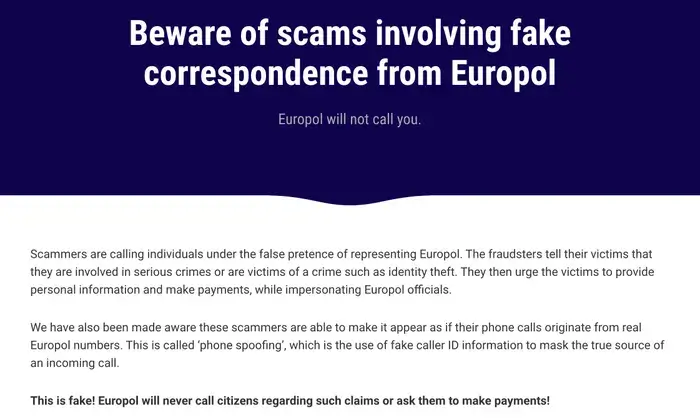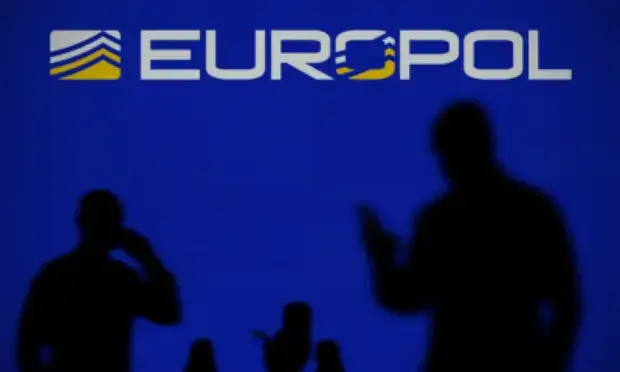Perusers or main interest group who wish to know the subtleties of the Europol Scam Call, read this article till the finish to find out more.
Is it true that you are searching for the subtleties of a trick call alert? Who is working this Scam? What are the dangers presented to the overall population from this Scam? Perusers who wish to know the subtleties of the Europol trick, you’ve arrived on the best page.
How to Spot a Europol Scam Call? Often, people get scammed by fake calls claiming to be from Europol. In reality, they are not. Using the technology called phone spoofing, scammers can pretend that a call is from Europol, but it’s not from the real agency. A Europol call will never ask you to pay money or answer questions about allegations. If you receive one of these calls, ignore it.
Europol information has as of late been hacked, prompting colossal misrepresentation brings in Germany. Occupants are getting trick calls from fraudsters. Every one of the people who got an Europol Scam Call, investigate the headers till the finish to know the connected realities.
Fake calls from Europol
Fake calls from Europol are becoming more common. Scammers are impersonating Europol officials and attempting to steal your financial information. The Federal Criminal Police Office in Germany has warned citizens to be aware of this scam campaign. Recently, a woman named Kristina Ohr received a scam call. She initially thought it was legitimate, but her colleague told her it was not. In this article, she warns about how to avoid falling victim to these scammers.
Scammers are using a flaw in the telecoms infrastructure to spread the scam. They make phones display fake police and Europol numbers, so that victims believe they are actually speaking to a law enforcement officer. In Germany alone, the Federal Network Agency has received more than 7.000 complaints of this type of scam. However, it is not uncommon for the scammers to target other European countries as well, such as France and Austria.
The Federal Criminal Police Office of Germany has warned citizens to be wary of fake calls from Europol. The alleged scammers are impersonating Europol officers in order to coax individuals into giving them their personal information. They often claim to be Europol officials and use stolen information to commit crimes. The callers also claim to have the authority to arrest and detain their victims. If you receive a call like this, you should hang up right away.
A recent scam involving fake Europol calls has been making headlines in Germany. The scammers falsely claim to be from the law enforcement agency and claim that they are using stolen personal information to target people. The Europol Scam calls are being distributed by individuals who obtain their information illegally from the internet. They often display a real authority phone number and a mobile phone number on the caller ID. The scammers use special software to fake their identities, so they can’t be detected.
In February of 2022, the scammers started calling people claiming to be Europol and demanding personal information. Many people fell victim to the scam and have been filing complaints against these unscrupulous individuals. The scammers have repeatedly tried to trick people by asking them to pay a fee or giving their personal information. In the majority of cases, victims have been scammed several times. If you are a victim of this scam, you should immediately contact your bank and file a complaint.

Phishing
A growing number of people are receiving phishing Europol scam calls in recent months. These scammers pretend to be representatives of Europol and demand personal and financial information. The Federal Network Agency has received over 7,000 complaints since the beginning of February. The Federal Criminal Police Office says that victims should avoid giving out personal information over the phone. These scammers are not Europol employees and they do not have the authority to fine people.
Fraudsters use a technical flaw in the telecommunications network to pretend to be Europol or Interpol officers. They then display a fake police or Europol caller ID on the victims’ phones, causing them to believe the call is coming from an official agency. The scammers have already defrauded many people of millions of euros. Germany’s Federal Network Agency says that it has received more than 7.000 complaints about scam calls. It is expected that the actual number of calls is far higher.
The scammers pretend to be officials of Interpol or Europol or even BKA and ask victims to give their personal details or to send money. They may also ask them to buy gift cards, cryptocurrency, or vouchers. These calls are very dangerous and you should never respond to them. However, if you have been a victim of one of these scams, you should report it to Action Fraud. The scammers are trying to steal your personal information.
A recent German police investigation uncovered that the Polish gang that operated these scams was using these calls. This group targeted elderly people. The Europol scam is more sophisticated and technologically advanced, and calls are arriving in Germany via Indian networks, suggesting they are being routed across borders. The BKA warns people to remain vigilant and not to respond to these scams. Even if the Europol call is real, it is unlikely to ask for any money.
The Europol Scam has been reported to have started on February 2022. There are 22,000 cases of this scam so far, and most of these include a repeat call. In some cases, the fraudsters called multiple times, and the victims were repeatedly asked to send personal information or pay a fee. These scams are a real headache for people living in Germany. There is no real reason to give your personal information over the phone.
Insights regarding the Scam
Europol is another sort of Scam led over calls that are as of late acquiring publicity among the occupants. Different rounds over the equivalent have been embraced, representing a serious danger to global and public offices.
German media transmission controller has as of late presented a report that they have gotten around 7600 calls for protests saying that calls from Europol poly have rung on their gadget. This information is brought exclusively for June.
Fraud attempts using fake letters from Europol
In recent weeks, Europol has been the target of a number of fraud attempts involving fake letters claiming to be from the Executive Director of Europol or other senior officials. These forged letters often use the names of Europol’s own staff members, as well as that of various international law enforcement officials. These forged letters are sent by third-party companies. Fortunately, there are ways to avoid becoming a victim of these scams.
The scam is not confined to letters – scammers have also used fake phone numbers to defraud people of millions of euros. Germany’s telecommunications regulator says it received a record number of complaints about the scam in June, but the number of unreported calls is likely to be many times higher. Fraud attempts using fake letters from Europol have also been reported in Poland and other European countries.
Despite the high volume of scams involving fake letters from Europol, the fraudsters have been targeted in Germany, France, and Austria as well. German police have warned their citizens of the scam and advised them to put their phones away. However, investigations into these scams have been slow to progress. In Germany, investigations are left up to the 16 state police forces, who then have to investigate each case on an individual basis.
Another type of scam involved sending a fraudulent email claiming to be Europol. Often, these scams will ask people to pay a sum of money to a Europol contact centre. In some cases, the money will be used to clear their name and prevent them from being arrested. The scam will generally come from an anonymous source. Although the scam is a sophisticated phishing attempt, it is worth investigating if the email is authentic.
Fake emails and letters sent by INTERPOL may be threatening. Be sure to report any suspicious correspondence to Europol. You may also be asked to provide your bank account details. However, you shouldn’t send any money under pressure. Unless you have used the service mentioned in the email, you’re probably being scammed. The scammer may also try to extort you by pretending to be an assassin.

Europol Scam Call-How did it Begin?
Perusers who are new to Scam and searching for the subtleties of how this story started, this bring began once again a call. Clients have gotten a trick call from Europol, and when they have addressed these calls, they have a computerized message saying that cops are holding up over the other line.
They are then approached to squeeze 1 to proceed with the message, and every one of the clients who press one are additionally mechanized to a misrepresentation call. These fraudsters guarantee to be the German Federal or Europol criminal official from BKA, starting the Europol Scam Call.
How can fraudsters trap their clients?
Since we have proactively referenced the subtleties of this Scam and how it started, these con artists direct or make dangers among their guests, saying they are either the survivors of some serious wrongdoing, including data fraud or other related occasions. They further request that they send their own data so that cops could save them from these dangers.
Moreover, they likewise encourage them to make a few installments against the security gave to them by the cops.
Avoiding Europol scam calls
Many people are receiving bogus Europol scam calls in an effort to defraud them of their money. The calls are usually made from a foreign phone number impersonating an official from the Europol or Interpol agencies. The Europol scams have caused millions of euros to be lost to these scammers. Germany’s telecommunications regulator said that in June alone, it had received a record number of complaints from victims, though the actual figure is likely to be many times higher.
Scammers impersonating Europol can create fake caller ID to make their calls seem like they are from the actual agency. This is called phone spoofing. It involves using a computer program to hide the true caller’s identity. While Europol may be the agency responsible for investigating crimes, the agency will never ask its citizens to send money or provide personal details. If you receive a Europol scam call, make sure to read all the headers carefully and wait until the end.
In June, the Federal Network Agency, which regulates German telecommunications, received more than 7,600 complaints about the Europol scam. The scam usually begins with an automated message asking the caller to press 1 to continue. This will then connect the victim to the scammer. The scammers will impersonate an official and attempt to make you feel pressured into providing personal information and making payments. The victims will often be asked to answer more than one question, and it will continue to repeat itself several times.
When did this Scam start?
In the wake of getting out every one of the subtleties for this Europol Scam Call and learning the cycle, we should likewise go through when it began and what it meant for the mass. This all begun back in February 2022. From that point forward, 22,000 arguments against the equivalent have been accounted for, and these cases have referenced that fraudsters have called them at least a few times or two times.
Conclusion
Europol Scam has shaken German occupants as these fraudsters are catching mass clients, leaning toward amount over quality. This mass-scale conspire requests that inhabitants pay some sum or send their own data for the Scam.
- Also Read: Condogames.xyz Roblox Know The Exciting Details!
- Also Read: Kitten Milk Roblox Know The Complete Details!
- Also Read: How To Get Roblox Voice Chat Without ID Know The Exciting Details!










